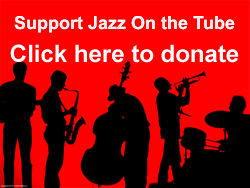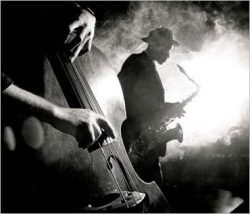Artist-Educators, People, Video
One of the great living music masters of New Orleans music, Shannon Powell, suffered a stroke and he and his family need our help.
He has given so much to so many, especially young musicians. Let’s do what we can to pitch in and help.
Shannon Powell gives a lesson at the University of New Orleans
– Ken McCarthy
Jazz on the Tube
P.S. Our unique programming is made possible by help from people like you. Learn how you can contribute to our efforts here: Support Jazz on the Tube
Thanks.
Producer-Presenters, Video
Saturday | June 22, 2024 | 7:30 p.m.
Hostos Community College
450 Grand Concourse,
Bronx, New York 10451
RESERVED SEATING
$20 Regular | $18 Seniors
$5 Students/Youth
Box Office: (718) 518-4455
Hostos Center presents the legendary drummer, percussionist, Bronx Walk of Fame artist and native Nuyorican S.O.B. (Son of the Bronx) Bobby Sanabria with his incredible 24-piece multi-Grammy nominated Multiverse Big Band in a concert honoring Puerto Rico’s greatest composers, including Rafael Hernández, Bobby Capó, Juan Tizol, Eddie Palmieri and more, along with a special tribute celebrating Duke Ellington’s 125th Birthday.
The concert will feature vocalists Janis Siegel (The Manhattan Transfer), Antoinette Montague (Duke Ellington Orchestra), and (multi-lingual powerhouse star of the Sugar Hill Nutcracker) Jennifer Jade Ledesna. Special dance performances by the acclaimed Danza Fiesta!
For more info and to get tickets:
http://hostoscenter.org/
– Ken McCarthy
Jazz on the Tube
P.S. Our unique programming is made possible by help from people like you. Learn how you can contribute to our efforts here: Support Jazz on the Tube
Thanks.
Cuba, History, Video
The year was 1984.
David Letterman had an audience in the millions and he invited David Amram on to demonstrate the instruments in his collection.,
This might be the biggest group of people ever to get a lesson in world music.
– Ken McCarthy
Jazz on the Tube
P.S. Our unique programming is made possible by help from people like you. Learn how you can contribute to our efforts here: Support Jazz on the Tube
Thanks.
History, Video
Modern Gospel has had a huge impact on jazz.
Not so coincidentally, Thomas Dorsy, one of its primary pioneers was living, working, and playing in Chicago at the same time as King Oliver, Louis Armstrong, and Bix Beiderbecke.
Of course, the music’s roots go way back before the 1920s.
A beautiful historical survey of the Spirituals tradition and how its impact is still felt and heard today.
– Ken McCarthy
Jazz on the Tube
P.S. Our unique programming is made possible by help from people like you. Learn how you can contribute to our efforts here: Support Jazz on the Tube
Thanks.
History, Video
Listeners with savvy ears know you can hear a lot of “gospel” in jazz and rock and roll.
But what do we mean when we say “gospel music”?
Unlike other forms of roots music whose origins come from the distant mists of time, we know when and where the music we call gospel started.
Meet the highly underrated Thomas A. Dorsey.
Born in Georgia and settled as an adult in Chicago, he broke the cultural logjam between “church” and “honky-tonk” music and helped light a creative fire, we’re all still warming ourselves on today.
– Ken McCarthy
Jazz on the Tube
P.S. Our unique programming is made possible by help from people like you. Learn how you can contribute to our efforts here: Support Jazz on the Tube
Thanks.
History, Video
This is a continuation of my country, blues, jazz, gospel – and a lot of it came from the countryside and country people – rant from a few months ago.
We all know about the roles big cities played in the advancement of jazz. How much do we know about the role country people played?
By good fortune, I found a resource where two people, a brother and sister, who are representative of this story, go into the details of their musical life being raised in a small town in rural parts in the 30s and 40s.
My previous video on this subject
– Ken McCarthy
Jazz on the Tube
P.S. Our unique programming is made possible by help from people like you. Learn how you can contribute to our efforts here: Support Jazz on the Tube
Thanks.


